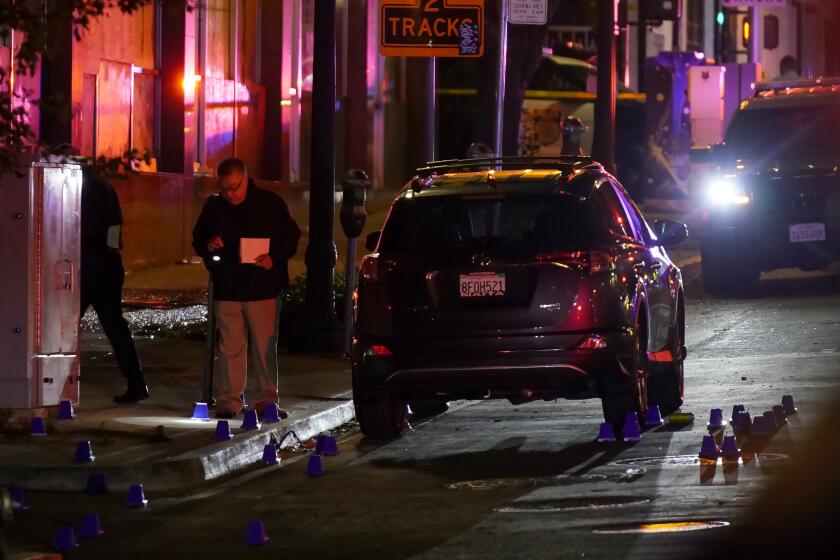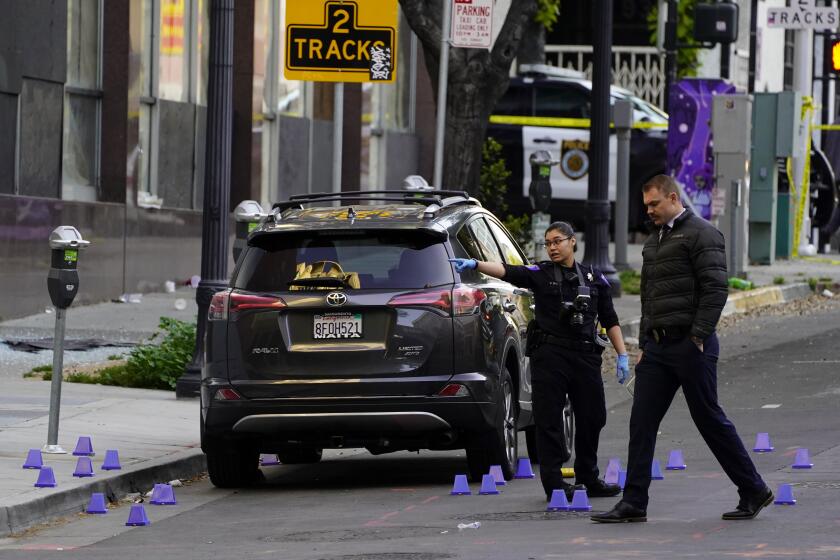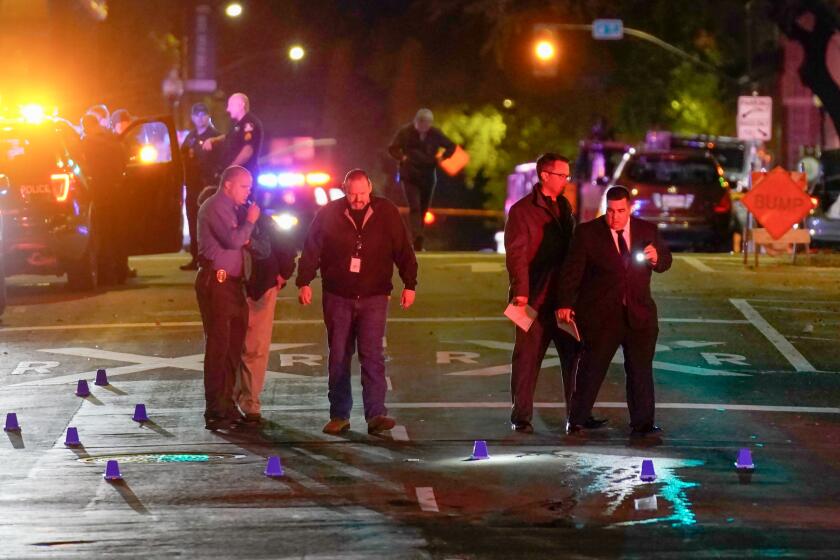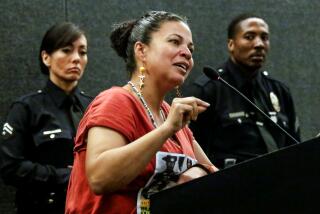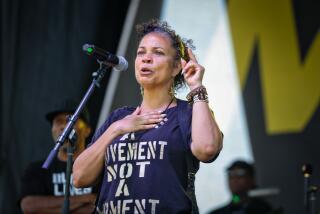‘A beautiful soul’: Homeless woman is killed in Sacramento mass shooting
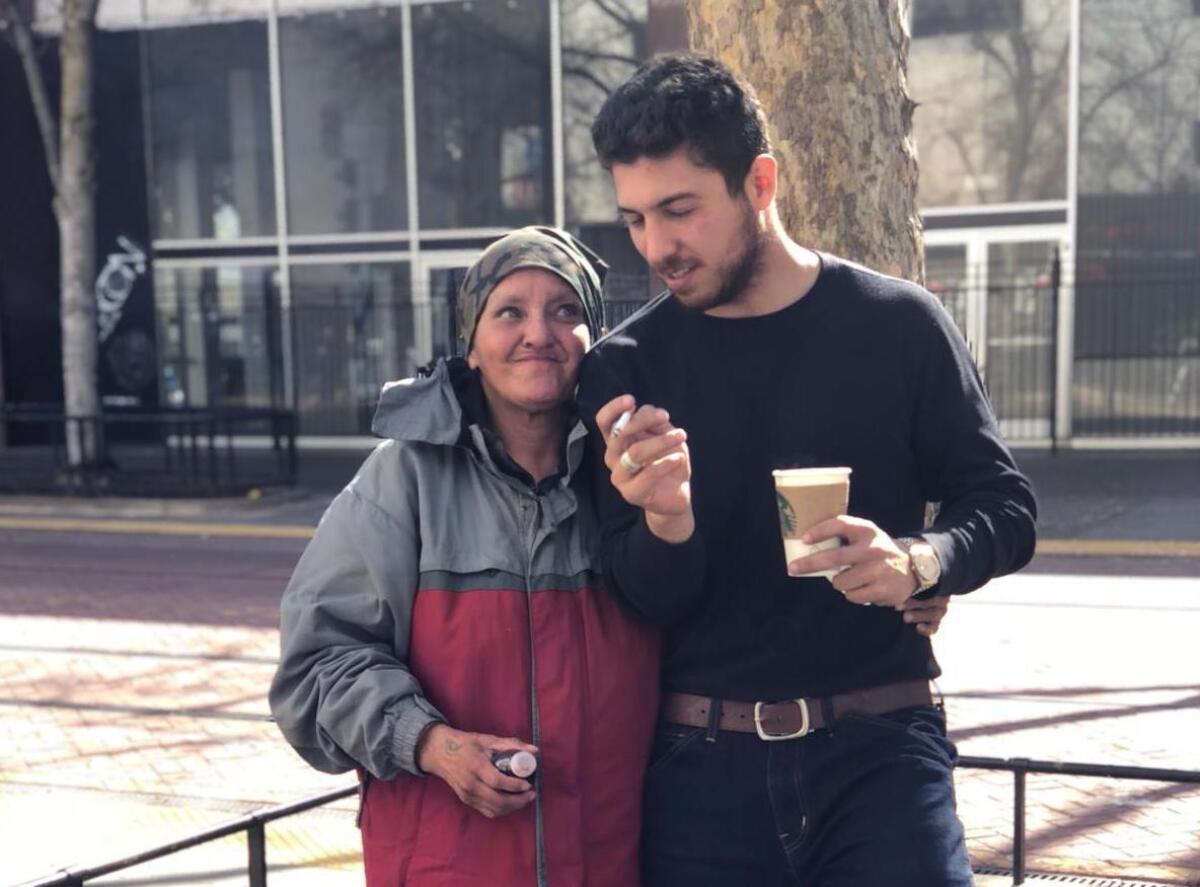
- Share via
SACRAMENTO — Monday morning, a man in a top hat with a sparkling white tuba posted up on the corner near where six people were fatally gunned down and a dozen were wounded over the weekend. He was playing “Battle Hymn of the Republic” on repeat.
Mine eyes have seen the glory of the coming of the Lord,
He is trampling out the vintage where the grapes of wrath are stored...
It was a strange but fitting soundtrack to the grief and disbelief spreading through this troubled stretch of shops and bars and nightclubs a few minutes’ walk from both the state Capitol and Sacramento City Hall.
Melinda is dead.
The news floated through the air along with the music, bouncing from a drinking buddy to a shop owner, and kept going from there. While five of the people killed in the early hours of Sunday morning had come downtown to K Street to socialize and dance, Melinda Davis, 57, lived here. She was homeless, and slept in the doorways and alleys.
In some neighborhoods of Sacramento, population a bit over 500,000, homeless people aren’t strangers. They are unhoused neighbors, with familiar names and faces, and well-worn — and to some, annoying — routines. If someone has bedded down under the same grimy alcove for years, everyone knows that is their spot.
Relatives gathered near a bar where the gunfire is believed to have erupted, hugging each other, looking for information and coming to terms with losses.
So contrary to the popular notion of California’s unhoused being a nameless, faceless, needy mass of people, Melinda was not anonymous. Even if people didn’t like her, they knew her. They knew they were stuck with her, and so they made the best of it.
Nowhere in the capital city is this sort of thinking more true than on the gentrifying grid of tree-lined streets that surround the state Capitol.
At night, K Street is a bustling corridor of aspiringly high-end nightclubs and restaurants. But by day, it can be a desolate and depressing place. It’s where unhoused people who have run out of options often end up, shouting at invisible demons in the early hours, as the light rail rumbles past and lobbyists and staffers hurriedly make their way to their offices.
So, of all the people who were killed in downtown Sacramento in the wee hours of Sunday morning, it is perhaps Melinda who most represents all the ways California has failed its most vulnerable residents.
The lack of affordable housing, despite billions of dollars spent. The lack of mental health services, despite ample rhetoric from politicians. And the abundance of guns, despite some of the strictest restrictions in the nation.
Somehow, Melinda became a victim of all these failures at once, killed in the deadliest mass shooting of the year, bleeding out on a sidewalk that served as her home.
Man arrested in Sacramento mass shooting but not on homicide charges. More arrests likely, D.A. says
Authorities announced the arrest of a man with an extensive police record in connection with the mass shooting that killed six people and wounded 12 others. But he was not charged with homicide.
“We have this population of folks who have been just left to fend for themselves,” said Shannon Dominguez-Stevens, director of Maryhouse, a women’s shelter run by the nonprofit Loaves & Fishes. “I can’t ... I just can’t believe that it was one of our guests.”
It’s unclear what led Melinda into homelessness. Dominguez-Stevens tried reaching her siblings, but the numbers she had were disconnected. In 2016, the petite woman with bright eyes showed up at Maryhouse and “used our services off and on during that time, and she often said that she was looking for housing,” Dominguez-Stevens recalled.
Melinda hated being crammed indoors with lots of raucous and sometimes testy people, as is often the case at Maryhouse when meals are being served, laundry is being done and showers are being used. So she never stayed long.
“She was the one who was kind of in the background of things, you know?” Dominguez-Stevens said. “Her personality wasn’t big. She kind of crept in and crept out, got what she needed.”
But then, for some reason, Melinda just stopped coming.
“And we haven’t seen her in years, really,” Dominguez-Stevens added. “I didn’t even know that she was back sleeping downtown.”
She was always a regular on K Street, though, said her friend Roy Goad, who guessed he’d known her for about 10 years.
More guns, including assault weapons, are on the street, as the mass shooting in Sacramento reveals all too brutally.
He was in his electric scooter enjoying some fresh air Monday when he heard Melinda was gone. Like many who live downtown, Melinda had her vices, Goad said. One of them was a penchant for drinking, which they sometimes did together. Vodka or Fireball.
Goad never knew her backstory, but “she had a really good personality,” he said. She was a “happy-go-lucky” person who “never started trouble.”
Many of those who knew Melinda also said she wrestled with mental illness and addiction. So not everyone on K Street felt the love.
One shopkeeper said another shopkeeper had installed a safety gate because of trouble Melinda caused. No one in that establishment would talk about her, but their silence said enough.
Ibrahim Abukhdair said he “loved her.” It was clear from the stunned look in his soft eyes that he did. She called him “bay-bee,” dragging out the word. He bought her food. She was “hilarious,” Abukhdair said, speaking while he sat on the edge of a concrete planter and absorbed the news.
“She was just a beautiful soul,” he said. “No matter her circumstances, she always had a smile on her face.”
He showed off pictures of Melinda on his phone. She was looking at him with an impish expression while he smoked a cigarette.
“Poor Melinda,” said his father, Ismail, standing next to his son.
The Abukhdairs own multiple businesses downtown. They do well. On Monday, Ibrahim had on a button-down shirt so perfectly pressed it could only have been taken off a dry cleaner’s hanger a few hours ago — a stark contrast to the rumpled poverty around him.
The father and son could have been the kind of people who shunned Melinda. But they’d come to know too many unhoused neighbors like her to think of her or them as anything but deeply hurt humans. Damaged, dysfunctional, but no less deserving of compassion for all their brokenness.
Melinda didn’t want to live on the street, the younger Abukhdair said. She had found housing through a government program, but lost it after “inviting too many people to party,” Goad added.
Back on K Street, she was unhappy. She’s in a happier place now, Ibrahim hopes. She didn’t want to live like this.
But, the men agreed, no one deserved to die like she did.
More to Read
Sign up for Essential California
The most important California stories and recommendations in your inbox every morning.
You may occasionally receive promotional content from the Los Angeles Times.
